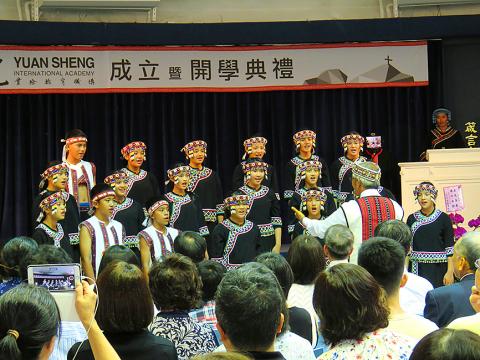The nation’s first experimental high school with a focus on teaching Aboriginal music opened in New Taipei City yesterday.
Vox Nativa, the organization behind the school’s development, said it hopes the school will help elevate the status of Aboriginal music and bring new opportunities to people in or around Nantou County’s Sinyi Township (信義), where the group originated.
The organization in 2008 opened its first music school for young Aborigines.

Photo: Chen Hsin-yu, Taipei Times
Vox Nativa was born out of a project to provide music education to the county’s Aboriginal youth envisioned by Sinyi Elementary School principal Bukut Tasualuam of the Bunun people and retired teacher Liao A-kuan (廖阿貫).
The group started by forming a youth choir with students at the elementary school.
They aimed to “let the world hear Jade Mountain sing,” Liao said.
The choir practiced on weekends and used dormitories at Luona and Tumpu elementary schools in Sinyi to house students, who were chosen from among the township’s more outstanding students, she said.
In addition to providing music education, the choir assisted students with Chinese, English, mathematics and social science studies.
Ten years after its founding, the group has been dubbed “Taiwan’s Vienna choir” and has received international recognition.
However, members of the original choir are now at university and many have moved away, some even turning their backs on their community, Liao said.
The establishment of an experimental high school will give the organization more flexibility and help with resources, she said.
After Christ’s College Taipei agreed to lend dormitories to Vox Nativa — also a Christian organization — the group finalized plans to establish the high school in New Taipei City, near the college, Liao said, adding that they rushed to have the school open in time to accept graduating junior-high school students.
The school on Monday last week received permission to operate.
Vox Nativa president Chiu Yuan-mei (邱媛美) said its first 10 students are from Nantou and they pay NT$5,000 in tuition per quarter. That fee covers textbooks and dormitory accommodation, Chiu said.
The school has so far hired nearly as many teachers as students, she said, citing regulations that high schools must offer Chinese, English and math, on top of its own requirements for music theory teachers.
The majority of funding comes from donations, Chiu said.
The school hopes to one day accept Aboriginal students from other countries and plans to produce a national-level choir, she said.
However, ultimately the school aims to foster confidence among young Aborigines, encourage them to serve their communities, and help end alcoholism and other problems that plague their communities, she said.

The first global hotel Keys Selection by the Michelin Guide includes four hotels in Taiwan, Michelin announced yesterday. All four received the “Michelin One Key,” indicating guests are to experience a “very special stay” at any of the locations as the establishments are “a true gem with personality. Service always goes the extra mile, and the hotel provides much more than others in its price range.” Of the four hotels, three are located in Taipei and one in Taichung. In Taipei, the One Key accolades were awarded to the Capella Taipei, Kimpton Da An Taipei and Mandarin Oriental Taipei. Capella Taipei was described by

EVA Airways today confirmed the death of a flight attendant on Saturday upon their return to Taiwan and said an internal investigation has been launched, as criticism mounted over a social media post accusing the airline of failing to offer sufficient employee protections. According to the post, the flight attendant complained of feeling sick on board a flight, but was unable to take sick leave or access medical care. The crew member allegedly did not receive assistance from the chief purser, who failed to heed their requests for medical attention or call an ambulance once the flight landed, the post said. As sick

Minister of Economic Affairs Kung Ming-hsin (龔明鑫) yesterday said that private-sector refiners are willing to stop buying Russian naphtha should the EU ask them to, after a group of non-governmental organizations, including the Centre for Research on Energy and Clean Air (CREA), criticized the nation’s continued business with the country. While Taiwan joined the US and its Western allies in putting broad sanctions on Russia after it invaded Ukraine in 2022, it did not explicitly ban imports of naphtha, a major hard-currency earner for Russia. While state-owned firms stopped importing Russian oil in 2023, there is no restriction on private companies to

INDUSTRY: Beijing’s latest export measures go beyond targeting the US and would likely affect any country that uses Chinese rare earths or related tech, an academic said Taiwanese industries could face significant disruption from China’s newly tightened export controls on rare earth elements, as much of Taiwan’s supply indirectly depends on Chinese materials processed in Japan, a local expert said yesterday. Kristy Hsu (徐遵慈), director of the Taiwan ASEAN Studies Center at the Chung-Hua Institution for Economic Research, said that China’s latest export measures go far beyond targeting the US and would likely affect any country that uses Chinese rare earths or related technologies. With Japan and Southeast Asian countries among those expected to be hit, Taiwan could feel the impact through its reliance on Japanese-made semi-finished products and